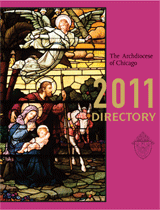Adams was black Catholics’ ‘voice at the table’

A regular feature of The Catholic New World, The InterVIEW is an in-depth conversation with a person whose words, actions or ideas affect today's Catholic. It may be affirming of faith or confrontational. But it will always be stimulating.
The Office for Black Catholic Ministry was five years old when Sheila Adams took the helm in 1990. It had just started a number of initiatives aimed at getting the black Catholic community “a seat at the table,” Adams said. Now, 19 years later, Adams is reflecting on the accomplishments of the office, now called the Office for Black Catholics, as she prepares to retire June 30. Over the years, the office has participated in national black Catholic congresses, organized the black Catholic convocation here in the archdiocese and seen the closings of many parishes and schools in its community. At the same time, some parishes have been revitalized and lay leadership is growing.
Mary Norfleet-Johnson, now a vicariate coordinator for the Office for Catechesis and Youth Ministry, has been named her successor.
Adams talked with Catholic New World assistant editor Michelle Martin.
Catholic New World: Why is it necessary to have an Office for Black Catholics?
Sheila Adams: From the get-go, the community wanted a voice at what we call the decision-making table. In order to have a voice at the decision-making table, you have to have someone at the table, so you need to have an office, not just a liaison or someone like that, so that office can have a voice. It needs to be part of the pastoral center. It needs to have that communication link with the community as well as with the hierarchy of the church. That’s what a good director does. A director is a communicator between those two, between the parishes and the schools and their leadership and also with the agencies. That has been my work for the last 19 years.
CNW: What’s the state of ministry to black Catholics in the archdiocese today, and how is that different from when you took the position 19 years ago?
Adams: When I came on in ’90 we had just finished the first Black Catholic Congress of the decade, I guess you could say, in 1987. Chicago has participated in five of the congresses, and number six will be coming up in 2012.
The themes or the topics that the congresses have worked with, a number of them are topics from the first congress all the way back in the 1800s, so they are things that are very important to the black Catholic community: education, evangelization, vocations and schools. Those things keep coming up and they will repeat.
CNW: What did the Black Catholic Convocation lead to?
Adams: Ever since 2000, we have been implementing all the things that the community came forward with. There again, it was almost the same five topics. Evangelization was uppermost, followed by parishes, schools, vocations and then tithing.
As we began implementing it, there were some things that weren’t on there before; Bishop [Joseph] Perry was very concerned with liturgy and how he saw liturgy happening in some of our parishes. He put together a liturgy subcommittee. We have been able since 2003 to give free workshops on liturgy, in cooperation with the Office for Divine Worship. We started out with the GIRM (General Instruction of the Roman Missal) and began teaching parishes what the GIRM was all about and how to implement that in their parishes.
CNW: What about the state of black Catholic lay leadership?
Adams: When I started in ’90, there was no Augustus Tolton Pastoral Ministry Program at Catholic Theological Union. It was just beginning. The conversation came about just as I was being hired and we launched it that year. We had our first graduates from the program in ’94. Right now, we have 21 graduates from the program — black Catholic men and women who have received their master of theological studies or M.Divs from Catholic Theological Union.
A number of those graduates actually work here in the pastoral center and we have at least two who work in our Catholic high schools.
CNW: What do you see for the future?
Adams: In terms of future, the office is going to have to do a concerted effort to reach out to black young adult Catholics. Those who are in their 20s and 30s are who we need to reach. Getting them interested in diocesan work is very important. And not just diocesan work. Getting them on board period in terms of their parishes and in terms of their Roman Catholic faith will be a big thing.
As soon as Mary [Norfleet-Johnson] and the advisory board complete that reach-out to the young people, then their voice is going to need to be heard. They have slightly different issues, but yet in some ways the same. They still need to be heard at the bargaining table.




